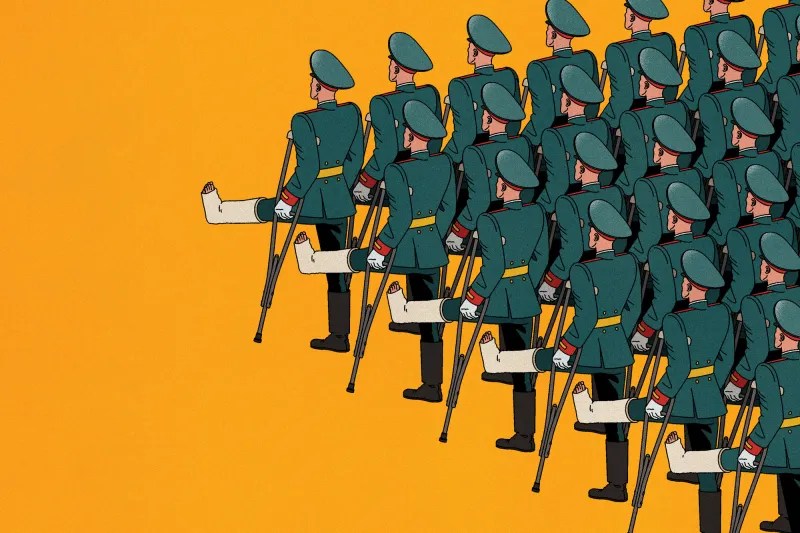American Hegemony – Perpetual Wars and the Solution to a Multipolar World Fouad Al, Haje
Fouad Al-Haj

American Hegemony – Perpetual Wars and the Solution to a Multipolar World
Fouad Al- Haj
In today’s style of leadership based on physical control, whether it is a single American or an Atlantic domination involving members of the industrial club of the largest and richest countries, no goal of the international community, whether it is human development, which has become a tragic issue, global security, or democracy and respect for human rights, can be achieved as it faces the double standards of American characterization.
Within the framework of maintaining the current method of domination, which is based on the sole opinion and dictation and coercion of others to adhere to the agenda and priorities of the new American imperialism, there can be no accountability of any kind. No party will feel responsible for the cracks, turmoil, and deterioration of the material and moral conditions of three-quarters of human beings. It is already practiced, making it impossible to find solutions to any of the global problems at hand.
Annexation is not the basis for forming genuine international leadership that considers the problems and challenges facing the human community and seeks conditions to address them responsibly, rather than pursuing irresponsible action. Instead, it involves identifying addresses and forming solutions, considering the irresponsible pursuit of humanitarian interests.
The only alternative to capitalist domination, which is based on supremacy and power on one hand and the imposition of acquiescence on the other, is to create leadership through multilateral negotiations.
There will be no way out of the current situation and no possibility of stopping the deterioration of the international situation. An end to the neo-colonial hegemony led by America can only be imagined if a large international group, including some important industrialized countries, succeeds in forming a pole capable of creating new conditions of balance of power that will allow a reconsideration of the way in which international affairs have been managed, which Washington has linked to achieving total control over the countries of the world.
The reality of the leadership base on multilateral negotiations imposes many conditions, the first of which is the exclusion of resorting to violence and war to resolve conflicts of interest for the benefit of the strongest, and accepting the recourse to an international bill as an alternative to the so-called United Nations body controlled by the United States in the so-called United Nations Security Council, if the rules of the political game in that body and its Security Council are not changed, and the imposition of an international bill agreed upon and accepted by the majority of countries in the world and humanitarian organizations and groups, one of its tasks is to develop A culture of dialogue, understanding and cooperation instead of the existing culture of competition and collision.
Before that, to reach the formation of such a body, and as a prerequisite, mutual recognition among States and groups regardless of levels of power and influence, and the acceptance of a kind of equal rights in the determination of international affairs, which must be applied in the national sphere at the level of individual states, where all citizens must enjoy equal rights politically, regardless of their origin, class, influence and wealth, that is, the principle of equal solidarity among all citizens regardless of their abilities, talents and resources. It is considered an objective condition insofar as it expresses a moral breakthrough and is not achieved without it.
From now on, developing a new concept of international relations is not possible without creating a new climate and fostering a culture based on the principle of human solidarity.
Since the essence of the problem that prevents us from emerging from the quagmire of wars of rivalry is the advantages, benefits and spheres of influence that poison international relations, which lies in the missing element of morality in the world of politics, it is not certain that many countries are ready for such mutual recognition, based on the equal participation of all the peoples of the world, rich and poor, in the self-determination of humanity.
As long as it is difficult to reach an understanding on a practical and acceptable formula for humanitarian-ethical international resolution, it will be challenging to break free from the circle of colonial control and influence, which believes that achieving participation means losing the escape advantages of the countries they call superior!
I think that a large part of the difficulty also stems from the fact that the so-called major countries, which do not want the United States to impose its unilateral leadership on the world, are not ready to open the file of international policymaking, despite the appearance of the return of the Russian Federation to the international arena, and the appearance of China’s control over the international economy and industries, this means in one way or another its participation in the continuation of American control in order to guarantee its economic interests, despite the fact that successive American administrations are more and more inclined to The marginalization of China and Russia with the support of Britain and France through the so-called United Nations, because America fears that expanding the circle of participation of other non-Western countries and giving them the right of veto in the so-called UN Security Council will lead to the weakening of its current position in international politics, so that America will lose its colonial hegemony and become in favor of other new international powers Asian, African, and Latin American that are today completely excluded from the international decision-making system.
Hence, the tendency of the United States to have comprehensive control and secure its military, political, and symbolic means to achieve its hegemony over the world reflects the vacuum of international leadership and multilateralism, as the United States has not succeeded in imposing its unilateralism in regulating world affairs, except because other international powers, foremost of which are Europe, Japan, the Russian Federation, China, India, Brazil and other developing countries, have not succeeded in imposing a multilateralism or an effective formula for multilateral negotiations, and the United States will continue to impose its unilateral vision and imposition its agenda As long as other countries remain unable to form a force that can match the American power, in light of the absence of a comprehensive Arab that is dependent on America, politically and militarily, and in light of the growing lust of the mullahs of Qom and Tehran to control the Arab countries in the ِقشلاian Gulf, the Mediterranean countries, Africa, and some Pacific countries. America and other countries of the world should negotiate their national interests, not impose them as global interests. In a clearer sense, American unilateralism is not a historical imperative, despite the clear superiority of the United States in the military and technological fields. Still, it is an expression of the failure of other countries to reach an understanding that works to form an international pole capable of balancing American power, and to impose a global leadership based on developing a formula for multilateral international negotiations as a framework for addressing all international issues, including the United States’ relations with the rest of the world.
Just as unilateral leadership is the main catalyst for the development of the strategy of global domination and its war requirements, the success of the multilateral international negotiation approach is the basis for building a global leadership based on understanding and taking into account the different international interests of all countries, and thus the search for the necessary compromises between those interests to find lasting and effective solutions to global problems.
Just as unilateral leadership imposes a state of perpetual war, we are living in such a state today. What’s reflected in the current US policy, which does not declare war but prepares for a new one, suggests a reluctance to do so. The collective prepares but refrains from making a declaration. The leadership can only be established within the framework of real international peace.
(Note from the Editor, this article was written in 2009in Arabic, we translated it to English because it was valid then and now.)





